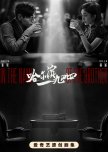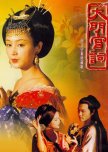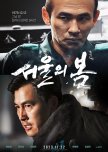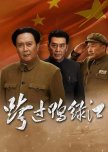
Don't Think Twice, Love's All Right is a good drama dragged down by the limitations of its industry
One only need to look at the comment section to see my commitment to this drama (/Shrug/ Li Yi Tong fan). Obviously, I had and have major incentives to declare this to be the best thing since grilled steaks. Alas!I was minutes away from finding out if the site has a 'zero' rating. Thankfully, Chinese drama writers after their obligatory sacrifices to tragedy managed to guide my 'ship' to port. Now, instead of being angry, I am merely annoyed.
The show is set in a large town where everybody is one acquaintance away from knowing each other. Essentially, there are four stories within:
1. The titular romance between our leads. Call this Pretty Woman with Chinese Characteristics. Contra those who avoided it purely 'cause of the male lead, in its first half, it is by a far the best thing about the show. It is truly heartwarming. Watch to episode 19 and stop!
2. The second romance is between a Legalist (The Chinese political theory of governance) and a broken-hearted romantic. Their romance is the funniest part of the show. Now I would totally watch a time-travel drama where a love-lorn romantic finds themself in Qin China. I didn't quite agree with the ending, but it was not all bad. It is the second-best part of the show.
3. The show starts to get weighed down by the other arcs. The usual drama, typical of C-dramas, involving scorned lovers and orbiters was generally weak and, in my view, unnecessary. But the man who broke our romantic's heart was charismatic enough to be a stand-out.
4. The absolute worst part of the show is the arc between Chinese Chuck Bass (When you see it, you'll see it) and Blair Wenwen. It has to be industry malpractice that allowed it to survive the cutting room.
The show tries to execute a complicated pirouette after episode 19 when it seems that our leads are sailing into a life of domestic bliss. They try to pull back the curtain and show life after the initial romantic glow fades. In my opinion, everything after that ruins the show. Episodes 1-19 were riveting television for me. After, it became a chore. I disagreed with every decision and typical of C-Dramas, they introduced far too many moving parts, dumbed down characters and engaged in aggressive acts of 'filler'--long pans, multiple flashbacks. The works!
This drama has many truly astounding actors. Li Yi Tong puts in the most charismatic turn I've seen on screen all year. I've got no beef with them. The writers, the production crew, the director and needlessly long drama seasons ruined what would have been an excellent drama. What-ifs aside, I cannot in good conscience recommend that you put in 30 hours on this. You won't be bored. That much is true, but I doubt you'd love it.
P.S
1. C-Dramas need to bin the whole 'scorned second woman' trope. Guaranteed cringe every time.
2. If you watch this, then after episode 19, skip to the opening scene of episode 37. Li Yi Tong manages to be both very cute and incredibly beautiful (there should be a word for that) and I don't think that is very fair.
3. Apple and Lenovo seem to have been major sponsors of this show. As far as I'm concerned, they are to be blamed for the post ep-19 clusterfucks.
4. https://mydramalist.com/35155-nodoka-no-niwa is the show that many of MDL users thought this would be. I'm tempted to watch it too, but the Japanese dial things up to 11 and I think I need lighter fare now.
5. C-Drama writers, tragedy is overrated. Happy endings and many babies for everybody; it won't kill you, you know.
Was this review helpful to you?

This review may contain spoilers
This is my first time writing one of these, I apologise if it is rough.The one thing I can promise you is that should you watch it, you'll find it hard to dislike any of the non-villainous characters. It is also important to note that there isn't an arc or end per se, the format is episodic and very 'plot-of-the week-y'. Your fondness for the characters is what is meant to keep you watching. As I am very fond of the characters, I did not mind this. So although the story isn't epic, it is not boring either. Certain aspects, especially the slow-motion cuts were, laugh out loud funny moments for me.
I can't praise the cast enough. They were all superb. Lyric Lan, in particular, shines as Dai Xi. I also appreciated certain character touches from the costumiers, for example, Dai Xi's fashion starts off urban casual: sneakers and blazers. But under the influence of her co-staff and an in-show use of her boss's credit card, she goes up-street over the course of the show. It was an attention to detail I appreciated.
I understand that the episodic format isn't for everyone, but honestly, this was one of the few Asian dramas where I did not tune off at some point due to heavy padding. Not that they were immune, as the season wound down, flashbacks galore ensued. Annoying.
All in all, this has my seal of approval. >>>Suits. Sue me!
Was this review helpful to you?

Enjoyable; not mind-blowing.
What if Sherlock Holmes was a foodie, not a druggie? What if he and Moriarty (and Watson) had a thing? What if Sherlock Holmes was Japanese?If you had ever been intrigued by any of those possibilities then Goro Akechi, The Gourmet Detective is a show that you will like. Even if none of the above interest you, but you're nonetheless interested in some light-fare to act as a palette cleanser for the tragic dramas of the A-Dramaverse than tuck right in. You will not regret giving this eight, or so, hours of your life.
Basically, you get to follow the adventures of an uber-smart detective and his cute, lovable assistant as they actually solve zero crimes. The positives of the drama are the acting, which is very strong, the characters, which are all likeable--even the villains-- and the cases which I think are meant to be taken more as social commentaries on contemporary Japanese society than as mysteries meant to have a resolution.
The negatives are the confused motivations of the main character and the rather OPness of the villain(s). Although, that is redeemed when their seeming immortality is played for laughs. I also feel that the villain is a character archetype in Japanese entertainment which might be lost to foreigners. I see her more as the fox-spirit trickster type than as a real, grounded character. I am not Japanese or even very literary, but I have watched my fair share of anime, and I am fairly sure I have encountered such characters before. That allowed me not to raise my eyebrows too high at some of the stuff she pulls.
Anyways, if you watch this, just bear in mind that this is a melodrama, a very melodramatic melodrama. Do not expect anything vaguely 'realistic' and you will have a blast.
Was this review helpful to you?

The Wandering Earth is less about what is on screen than what it makes you feel.
We are, I think, used to entertainment as Spectacle. With spectacle, the focus is on the screen itself: the explosions, the camera shots, the actors' craft. As a spectacle, The Wandering Earth falls short. The scenes are rushed, the environment is drab and the actors are not Daniel Day-Lewis and Meryl Streep. It is as a form of moral exhortation, a celebration of human genius and a reminder of how much we still have left to (and must) achieve that the film shines.The film is set during a moment in a vast project to guarantee the continuation of human civilisation outside our solar system. The technology and level of organisation deployed, without explanation, at the start of the film are advanced enough to be indistinguishable from magic. But really, stranger, with whom I am communicating across oceans 'telepathically', why would that need explaining, hmm? The point is less the plausibility of the tech than the (human) genius behind it. It is less our technology than our social milieu and the bonds of fellowship shared with family, friends and humanity that pushes us and grants us our ability. Plus Ultra! As Charles V would say.
The underlying philosophy is certainly 'collectivist' (Classical Athenian, if you prefer). Individuals are (deliberately?) forgettable, but their actions are what matters and what will live on. Consider the fact that we have no idea who invented the 'earth engines' that, literally, drive the plot. The point that individual selfishness can threaten civilisation is made both over the course of the movie as the protagonist (on earth) experiences his bildungsroman and when it seems that all hope for humanity is lost. Archibald MacLeish wrote that 'to see the earth as it truly is, small and blue and beautiful in that eternal silence where it floats, is to see ourselves as riders on the earth together, brothers on that bright loveliness in the eternal cold.' And in the film's climactic moment, it is 'together' that salvation happens. Even if during the course of acting 'together', many individual sacrifices occur. It is sad but worthy.
I suppose this is a film that would appeal more to the sort who joke about being too early to explore the seas and too late to explore the stars. They might feel, as Cecil Rhodes did on his deathbed, that there is 'So little done. So much to do.' But such is life, we stand on the shoulders of giants and it is we who will decide if those who follow us stand on the shoulders of midgets. I am proud to say that from the hour-mark, I was pretty much in tears. From across the screen, you can feel Mr Liu Cixin's pen asking: Are you worthy; Will you be?
It goes without saying that I will be pushing everybody I know to watch this.
Was this review helpful to you?

Younu Senki
In the Name of the Brother is a butterfly struggling to break free from the grounded life of a caterpillar. It failed. But, oh, what coulda been!It’s 1944, and Nippon’s teikoku is on its last legs. Ah la Gramsci, the Japanese Order was dying and a new world struggling to be born. We meet Gan Xue and the Song brothers as the remnants of the Japanese Kwantung army, Manchuko patriots, Guomindang agents and Communists struggle for power in an age of monsters. One-third of the story is an undifferentiated mess of assassinations, kidnappings and torture.
The third of the story about the Song brothers — Communist Agents Extraordinary — was the weakest and most frustrating part due to excessive plot armour except when the writers decided to scapegoat Gan Xue as the show’s villain. A particularly egregious intervention by the ghost in the machine in Episode 25 was so terrible that I spent minutes after the credits hysterically laughing. That said, Qin Hao elevated the role, as expected, and the tech they used to achieve the twinning effect was. . . impressive. I still do not understand what other purpose making the secondary protagonists twins had besides trying to make Gan Xue the villain! But that’s why I don’t make the big bucks.
Luckily Gan Xue saves the day. Best girl is stylish, not the smartest but competent. Most importantly for the world she inhabits, she is tenacious and ruthless. The subplot of what is an otherwise straightforward tragic arc is that her life was shaped by the many betrayals by all the men in her life. She yearned for family but lost it all in the end, fated to end her days in gaol.
It’s annoying that the writers gave what were very likeable characters an ending more bitter than all that gall Goujian ate to remember to delete Wu from history. They really tried to portray fleeing to Japan with a pretty girl and a bag of gold as the wrong idea! Then dared to end with literal flag-waving scenes. Nah, bro. Some people deserve the Jin Yi Wei.
So, I’m torn. How does one rate a bad story with great characters?
Oh well. At least the soundtrack was superb, and the casting was superb except for one notable exception. Alas, this was one of those directors in love with auteur shooting styles. The man was going for metaphors and unreliable narrator techniques. Too much, chief. Too much!
Was this review helpful to you?

The focus should have been on the duelling visions of 'just' between the Heng Emperor and Jingmen, with the romance focus on how torn the Empress is between the two men, and with a reflection on the age-old question of the merits of the logic of the 'greater good'. That would have made the ending sensible.
You'll probably skip parts, I did, but it isn't unwatchable. A little cheesy, but not TERRIBLE. I enjoyed the music in the opening segment, as well as Liu Yu Jun's Heng Emperor. Quite heavy shoulders he has from all the heavy lifting he had to do.
As I wrote, the character of Qian Xue was absolutely unnecessary. Also unnecessary was at least three companions the hero acquires along the way. The writers should have trimmed the fat!
Was this review helpful to you?

Houses Are for Living In
I’m a Philistine. So, I can freely admit to never having read John Milton’s *Paradise Lost*. I gather — *from sources unknown* — that its devil has all the best lines. And so, anti-heroes were born!*City of the City *is* *a tale about family, sacrifice, ambition and mentorship in the package of a finance (*ish*) drama. It won’t be winning any awards for its fidelity to the workings of the finance industry, but that’s beside the point. In the same way that palace dramas don’t bother with the humdrum aspects of bureaucracy, its bank setting was merely the background to a story about the temptations that life in the big city provides.
Tao Wu Ji (*Bai Yu Fan*) and Tian Xiao Hui (*Xia Meng*) are booed up graduands trying to make a life together in the worst Chinese job market in decades. Wu Ji lands his dream gig. Xiao Hui does not. Luckily, her mother doesn’t just have a *hukou* for the city, she’s got connections! And so, Xiao Hui avoids neetsville. But as everyone except — *I suppose* — those dreary Nords can attest, favours are never one way. A favour given today is an IOU for tomorrow. Pretty much every third-worlder agrees with Don Corleone that repayment is an offer we can’t refuse. The weight of gratitude and millennia of tradition would permit us nothing else.
Xiao Hui and Wu Ji are part of an ensemble of young characters who’ve all got big choices to make as the episodes unfold. The young had an uncertain path but most of the older characters were already wading in murky waters. The old make decisions that move the plot along and upend the lives of the young generation. The most noteworthy trio were Zhao Hui (*Liu Bei!*), Wu Xiao Long (*Yang Gong Gong!*) and Shen Jing (*Yang Zi Shan*).
Zhao Hui is the rainmaker for Shenmao Bank. At first glance, he seems like another of *Yu He Wei*’s many straight-laced characters. He’s the widowed, loving father to a girl suffering from macular degeneration. He’s immune to bribery and honey pots. Yet he’s prideful and possessed of a certain low cunning. That edgy side of his character escapes his iron discipline after he’s passed over for a promotion that — *like Cao Cao declining the imperial seal thrice *— he had pretended not to be interested in. That and his love for his daughter bind him closer to Wu Xiao Long, his adoptive brother who’s a heavily indebted real estate developer desperate for the liquidity Zhao Hui controls.
The little dragon is a devil perched on Zhao Hui’s shoulders negging him into embracing his worst impulses. But their dynamic is fascinating! I remain uncertain if their relationship was mutually exploitative or — *in its own way* — loving. Alas, a prequel shall never be.
The strong female character is an archetype that always risks flying too close to the sun — with the usual consequences. There is a temptation to give them special powers and render them uninteresting, make them preachy and thus annoying or glam them up into femme fatales and get cancelled. Although Maggie Q’s Nikita will never die! But. . . I digress.
Shen Jing is the best type of the SFC — she just does her job! If you’ve seen Olivia Colman in *The Night Manager* or *The Crown,* then you know the type. You wouldn’t spare her a second glance in the street, but an interaction at close quarters would be enough to enlighten you that you’re dealing with someone competent. Shen Jing is that sort, and she commands all her scenes.
I enjoyed this drama up to a point. More accurately, I was satisfied so long as the *villains* were winning. I was bored stiff once the pendulum swung back the other way. The heroes were bland and had no achievements but snitching. A society of slightly shady investment bankers can thrive; one packed to the brim with self-righteous auditors will stagnate. I kept yelling at the screen for Zhao Hui to move to Singapore before it was too late. Alas!
All in all, the story was pretty standard fare — neither yay nor meh. The production values were high, and I wasn’t bored.
Onwards to 2025!
Was this review helpful to you?

Soup and Fried
Hats off to the wise, unknown regulator who banned Chinese showrunners from indulgently long seasons.Fry Me to the Moon (yes, quite punny) is a walking advertisement by the Sichuan Tourism Board that would have likely overstayed its welcome under the past regime. However — in the new era — coming in at 24 episodes, it was tightly plotted, superbly cut and highly enjoyable. It singlehandedly cured me of my snobbery towards the Slice of Life genre. There is something to be said for low stakes and cheery —especially in 2024!
Fry Me to the Moon (FMTTM) is about Chuan Bai Lo. It’s a restaurant representing an idealised communal, relaxed, distinctly Sichuanese (which means numba one in China! (and the world!!!)) depiction of a dying China. Literally dying. Gu Da Peng (Zhang Guo Li), the restaurant’s head chef and owner is indebted and fatally ill. But he carries on, smiling through it all, hoping against hope that a changing world will leave his oasis untouched. That was not to be! Capital was coming.
The relentless march of capitalism’s drive for efficiency —turning all that was once solid into mist!— arrives in sleepy Chengdu in the guise of Liang Qing Ran (Charmaine Sheh). She’s the regional boss of Zhongting Capital, and she’s got a plan for Chuan Bai Lo that is at odds with the traditional view of what a restaurant should be.
Chuan Bai Lo must change. The question is how? FMTTM takes a side, and I very much enjoyed its story. I had minor quibbles over business terminology and the acting is merely competent, but everything is forgivable when you’re having fun. And that I did. So, yay!
I’ll flag that it’s a chick-flick —written and directed by women. I swear I did needlework unprompted afterwards! If you’re cooties-averse, this definitely isn’t for you. Otherwise, stellar! Also, Gu Man Ting —one of the show’s triumvirate of leads — is played by Li Chun. . .you know, Chun Li from Street Fighter! I ain’t got no jokes, sorry. Ahh, but Gu Man Ting was the best part of the show. At least, I think so. She’s its emotional core. And since princess-type characters aren’t easy to like, I think the show wouldn’t work with a less likeable actress in the role. Bravo, casting director!
Was this review helpful to you?

A Heavy Crown Leaves You Lonely
*The Rise of Phoenixes* would have been decent if it wasn’t 70 episodes long! The show was adapted from a novel called 凰权, literally Phoenix Power or Royal Authority. And since the phoenix is feminine while the dragon is male, despite not having read the novel, I’d wager that the author’s intent was to make the female lead, Feng Zhi Wei, the story’s protagonist. I feel that a story told solely from her perspective would have been superior to what we got.As things stand, the show tells multiple stories within the compressed medium of 70 roughly 40-minute episodes:
1. The Founding Emperor of the Tiansheng Dynasty’s coup and his machinations to maintain his autocracy against attempts by his co-conspirators to keep him in check, their heads attached and their families in power.
1. The love story between the emperor and a foreign tribeswoman.
2. The Sixth Prince, Ning Yi, and his bid for power to avenge the death of his mother — the aforementioned foreigner.
1. The love story between Ning Yi and Feng Zhiwei.
2. A palace power struggle between the princes.
3. The complicated relationship between father and son juxtaposed against their rivalry as aging autocrat and possible replacement.'
3. Feng Zhiwei’s attempt to make her way as a competent woman in a feudal society where the odds are stacked against her.
1. Her relationships with her harem of concubros.
4. The secret conspiracy among elements of the previous dynasty to destroy the Tiangsheng regime.
5. Ancillary plotlines like Tiansheng’s dealings with neighbours, the restoration of order in the aftermath of a bloody coup, the everyday difficulties of staffing a bureaucracy in the mediaeval age etc.
The plotlines outlined above mostly work as stand-alone arcs. However, attempts to combine them into a coherent storyline floundered. In the same way, this show’s biggest weakness was its inability to realise that it could only work with one lead. The result is that while its somewhat controversial ending makes some sense, the path it took to get there was frustrating and illogical.
In sum, this was an otherwise excellent production let down by terrible writing, direction and production. The fish rots from the head.
Was this review helpful to you?

Love's Nadir
Is art meant to be good or memorable?I don’t know.
But I kept returning to that question multiple times while watching *Palace of Desire, *alternatively known as *Auteur on Steroids*.
The (in)famous Wu Ze Tian had one daughter, Princess Taiping, who is this show’s protagonist. We follow her from her teenage years until her death in a lifetime characterised by four failed loves and an intimate understanding of the limits of power. Her life and this story are a tragedy. Happiness is hard-won and then fleeting.
As the final credits rolled, I wondered about the characters being little better than the shadow puppets they often manipulated for entertainment, and if we were any better. How much control do we really have? It’s a testament to the power of the tale that I feel a tad sullied in describing the tragedy portrayed as Shakespearian. Its achievement not only compares to such Shakespearian sagas as Titus Andronicus and The Dark Knight, but it might well surpass them.
https://youtu.be/qTfnJuE1l98?si=VsvJRkE9MPrvbkSAMy praise for the show as a work of art is fulsome. The soundtrack is haunting, the costumes superb, and the directing style—which takes some getting used to—fits the atmosphere like a glove. I dare say that Chinese has never sounded so mellifluous—the shadow puppet tales should be unescoed or something.
Yet.
I’m not certain if this show is good. I’ve never been bothered by that question for a show I rated so highly before. Consider the actor, Wen Hsuan Chao. He plays two characters whose resemblance is a key part of the plot and drives Taiping’s maturity. Yet, to my mind, his portrayal of the noble, tragic figure of Xue Shao was mediocre. To be fair, the role of a man driven by honour and desire to act in a contradictory fashion was always likely to be difficult. I’d dismissed him as only being cast because he’s one of the handsomest blokes I’d ever seen. And his characters looks are very much part of the story. Yet, the same guy becomes a world-beater in his interpretation of the Machiavellian Don Juan, Zhang Yi Zhi. And that’s pretty much how it goes with most of the cast except for Gui Ya Lei (Wu Ze Tian) and Zhou Xun (Young Princess Taiping).
Parts of the story struck me as needlessly contrived or handwavy too. And, yet, everything came together in a way that works! I might even rewatch it! And that’s rare for me.!
Was this review helpful to you?

Hottie on a Platter
My Name is Zhao Wudi is the story of the contract marriage between the eponymous hero and tech CEO, Sheng Xing Yu. She marries him to maintain control of her company, and he marries her as part of an inherited mission to protect her. The story unfolds as they fall in love and the broader mystery of the villains and their motivations emerge.That tale is fairly straightforward and has been told multiple times in various forms. What helps the show stand out is a cast with great chemistry and above-average comedic timing. Although some characters like Ali, the femme-fatale. struck me as superfluous, none of them got intolerably annoying.
Mini-dramas aren't exactly where one looks for premium story-telling or acting. But the cast is pretty, the story unfolds at a rapid pace and Zhao Yao Ke has something about her that brings to mind the first rains after the dry season. In sum, the show does nothing particularly excellently. But short of the sequel-baiting convoluted ending, it rarely fumbles either. There are worse ways to waste time.
Was this review helpful to you?

Unus Prevalet
Simply put, a country is a territory exclusively claimed by a given people. There are lands belonging to the people of the American states; those of the folks by the Niger, and the lands of the Koreans and so forth.Modern societies can only function if the people within countries believe themselves in concert. A vast propaganda apparatus and coercive institutions exist precisely to sustain that delusion. The best modern societies are the most cohesive, and thus those most firmly enthralled.
Yet, how many people can anybody know intimately in their country? How many are they entirely certain they could trust with their lives? Some are more fortunate in that regard than others. But not even with the most charismatic people can such amici number in the thousands. Even Jesus Christ only had eleven! Thus, for all that we would have it otherwise, the fact remains that all major human activities revolve around groups of intimates. A small cohesive group remains the most powerful human collective. They push the wheel.
For most of human history, something so obvious won’t have needed detailing. Our ancestors foraged in small bands of relatives. Those who settled as farmers or roamed as nomads were all related. Whether they were lords, peasants, slaves or raiders, strangers were rare! But mankind encountered the divine and birthed religion. Bureaucrats came into being to administer sacrifices to deities. Next came standing armies to defend them. It took some time, but then we invented corporations and endowed them with certain human rights. Then instant communication linked those above and those below by bypassing the middle.
The aggregate effect of all those eldritch creatures we term institutions is that modern man has to function in a world surrounded by strangers. And that works fine. Modernity has many fine substitutes for tangible reality. I’m not whispering in your ear right now. And yet, modernity cannot save us from the threat of an organised cabal. Its illusions crumble if they mount a concerted assault on our institutions. All that’s left are individuals who get swept aside and other groups who must decide whether to submit or fight. In the scrum where band meets band, only the most trusting and the best organised — the one that doesn’t wilt underneath the harsh rays of a zero-sum contest ( to the death!) will prevail. Those who seize the day become rulers.
12.12: The Day is a Korean masterpiece that more eloquently grapples with the above sentiments. It explores the events of the coup d’etat mounted by General Chun Doo-Hwan and his Hanahoe clique against their military colleagues and the Korean State within the medium of a thrilling two-hour drama. Spoilers — Chun Imperator, Ave!
It is obvious that the drama’s creators do not support the actions of the Hanahoe. I admire their creation because they avoided the temptations of lesser artists. There was no revisionism here. At least, so far as I can tell. They trusted in an intelligent audience to make their decisions about what was right or wrong. The viewer can see why those who followed Generals Chun or Lee would have made their choices and lived with the consequences. Although the creators place their thumb on the scales at certain moments in General Lee’s favour, it isn’t so blatant as to be preachy. This tale aims for mastery and artistic integrity over cheap partisan fervour.
It was also great watching a story that was 99% blokes where their motivations were straightforward. Most were following orders, and some just went with the flow. A minority knew the stakes all along, and the rest chose to stick with their guys because the alternative was either getting beat up by your boys for being a wet cat or getting trussed up as a scapegoat. Well, I suppose there was always snitching or cowardice — but, heaven forfend, right?! Every boarder who ever snuck out past lights out or who had to stash contraband during inspections knows the drill. I bet we’ll find this refreshing without the sugar and spice some lesser creators sneak in to titillate the screamy, fainty set.
All in all, this is a cinematic and literary masterpiece!
I bet Prez Yoon is watching this on repeat o:
Like the Josh Groban song . . . Don't Give Up!
Was this review helpful to you?

Dong Bei Fa
Stop me if you've heard this before: the empire once divided seeks to be united. Alas, barbarians lurk on the periphery trying to invade the Central Plains. A great northern expedition is necessary! Hell, when I close my eyes, I hear the echoes of Zhuge Liang's Northern Expedition memorial: He crossed the Lu, so Mao Zedong, Peng Dehuai and the volunteers of the People's Republic had to go Across the Yalu River.The show is a faithful rendition of the Korean War from the perspective of the People's Republic. It operates at four levels:
1. A news-reel style narration to fill in important information that couldn't be dramatised
2. War room dialogue featuring the principal political and military leaders
3. Battlefield command scenes where upcoming battles are planned
4. Battlefield scenes where soldiers charge, bombs fly and acts of heroism and sacrifice abound
It's all competently helmed, nothing memorable, distinctly average. The grand theme of the show is the struggle between mass and machine. The Chinese side are distinctly overmatched in industrial output and quality against the UN troops. However, the volunteer's force is possibly the most powerful and battle-tested force in China's long history. Except in the early stages of the war, when the overconfident UN troops are taken by surprise, it's scene after scene of superior UN armaments blowing Chinese to smitheerens. I gather it's meant to be heroic, and I could see it in the abstract. But seeing it unsubtly represented onscreen, my reaction was dismay at such waste. What was the point of it all?
That is a question the show struggles to answer. The Americans bombed China and seemed committed to driving the Inmingun straight into China. But the show didn't make me care. It seemed too much in a rush to get to the battle scenes that it forgot the human factor. The complete absence of Koreans as protagonists in the show also didn't help. The war scenes were competently executed spectacles although the special effects were lacking in some areas.
The story of the Yalu River intervention naturally makes an excellent drama. Alas, this production doesn't do it justice.
Was this review helpful to you?

Justice though Heavens Fall
The Legend of Kaifeng Court is one of the greatest movies I’ve seen. Its plot is tight and unfolds at a rapid pace. Its characters are endearing and well-formed. Most importantly, it sticks the landing—the immediate threat is vanquished but the systemic problems endure. As in life, good deeds can go unrewarded. That doesn’t mean that good men should do nothing!The protagonist is the famed Chinese jurist, Bao Zheng. The story leans more on the mythology that’s developed around the historical character. He’s very much an outlier among the show’s other characters in his unbending righteousness. The show heavily implies that he’s a god fallen to earth. Huang Wei De was spectacular portraying this alien who had to learn human.
In a world on the edge of ruin, there is little even a god can do. The Song Dynasty is beset by enemies abroad, traitors within and an unstable triumvirate between the Crown, Court and Frontier Military. Bao Zheng is very much a peripheral character. He’s so powerless in fact that were this a Ming or Qing-era show, he would not have made it past the first episode.
One of the best aspects of this show is how developed the characters are. In a way, it feels like an ensemble drama because events and disparate characters drive the plot forward. Bao Zheng is often the bit player in a wider game with active players possessing independent agendas and motivations. None of the side characters feel peripheral due to an excessive focus on the lead. That allows it to avoid one of the weaknesses of long Chinese serials where some episodes drag because they are fillers meant to resolve unaddressed plot issues or introduce characters previously unrelated to the plot. This show has no such flaws because storylines proceed in essentially self-contained arcs and its characters all feel like they have lives that do more than revolve around the whims of the protagonists.
The actors were superb. The writing deftly balanced humour and insight. But I must reserve special praise for the casting director. Action in Chinese dramas is typically unrealistic, but casting directors compound the disconnect by casting dandelions who can’t even throw a convincing punch. No such problems here. Every who fights looks like they can bang. Those who don’t look like fighters stay on the sideline or are quickly exposed.
More of that!
All in all, I love it; watch it!
Was this review helpful to you?

How to lose friends and not influence people
The Kirin is a mythical beast that emerges in times of peace. A symbol of peace then. All Might, but even more mythical.Peace is good. Therefore, summoning the Kirin must be too. But something is never given for nothing. Don't matter if you’re a Naruto or Full Metal Alchemist guy. The Japanese have taught you. Best of all, it's real!
The price of peace is violence and blood. All of them are consequences of the exertion of power. That changes people, and rarely for good. Weighty stuff for a drama to tackle. Kirin ga Kuru tries. That made it enjoyable enough. I’m more hesitant to conclude that it succeeded.
Kirin ga Kuru is a historical drama set during the Warring States era of Japan. Dai Nippon, the Weebs say. Sengoku Jidai to demonstrate your Total War: Shogun chops. Its central characters are Akechi Jubei Mitsuhide and Oda Nobunaga. Brutus and Caesar. They tried to summon the Kirin and died, friendless, for their trouble.
The narrative unfolds in three kinds of scenes. Cabinet scenes where the principals scheme, plan and monologue about their dreams. Truly top-notch and visceral battle scenes. I've come to appreciate the importance of excellently choreographed small-unit combat scenes. Troy is the standard, but the scenes here are the best I've seen since The Last Day in Changan. Finally, there are scenes that demonstrate the consequences of the cabinet scenes on the common folk—those fated to experience but rarely participate in history. I appreciated the touch. We commons rarely get shout-outs.
The battle scenes are its standout. Some of the monologues in the cabinet scenes could drag out, but I didn't mind much. I think the showrunners stuffed too many cameos from historical figures. Focusing on the machinations of the key players would have been preferable.
I also question the role of Doctor Toan, Koma and Kikimaru. They seem to act as the avatars of the audience and the common people. Yes, their presence often helps with plot exposition, but their role as main characters is awkward. I disagree with the director's choice to compress the narrative arc of multiple side characters into those three. Frankly, we spend too much time with characters who are unimportant in the story’s grand scheme.
I cannot fault professionals for their competence. Excellent acting is the baseline for any broadcast show, much like you expect basic spelling competence from me. That said, there are always levels to any craft. Sometani Shota as Oda and Sasaki Kiranosuke as Hideyoshi are particular standouts, immediately elevating all their scenes. The bad guys were cooler!
Kirin ga Kuru's is an artistic moving picture. Its cinematography is screensaver tier, and the musical team from John Graham down brings their orchestral and acoustic A-game! Haven't heard a soundtrack that good since Novoland: Pearl Eclipse.
Kirin ga Kuru doesn't drop the ball like Novoland did. But it, ultimately, isn't spectacular either. It's just there. It's The CW, not HBO, if you catch my drift. Interesting in patches but not something you'll be beating down doors to recommend.
Was this review helpful to you?






